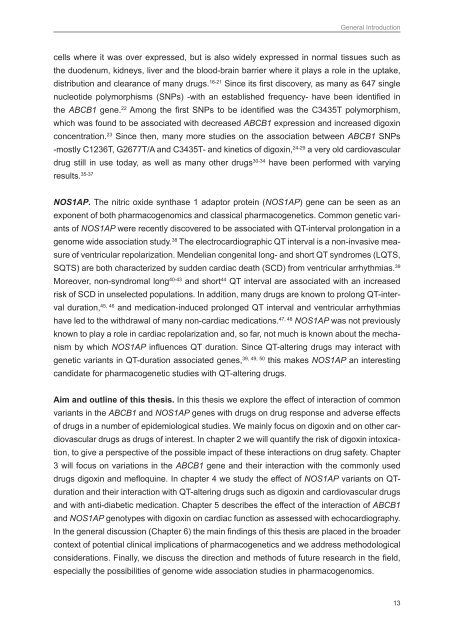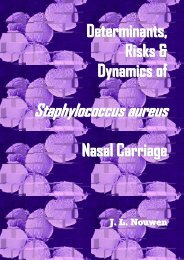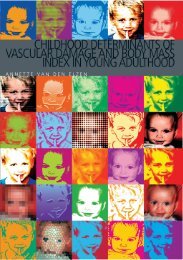Genetic susceptibility to adverse drug effects - Epidemiology ...
Genetic susceptibility to adverse drug effects - Epidemiology ...
Genetic susceptibility to adverse drug effects - Epidemiology ...
You also want an ePaper? Increase the reach of your titles
YUMPU automatically turns print PDFs into web optimized ePapers that Google loves.
General Introduction<br />
cells where it was over expressed, but is also widely expressed in normal tissues such as<br />
the duodenum, kidneys, liver and the blood-brain barrier where it plays a role in the uptake,<br />
distribution and clearance of many <strong>drug</strong>s. 16-21 Since its first discovery, as many as 647 single<br />
nucleotide polymorphisms (SNPs) -with an established frequency- have been identified in<br />
the ABCB1 gene. 22 Among the first SNPs <strong>to</strong> be identified was the C3435T polymorphism,<br />
which was found <strong>to</strong> be associated with decreased ABCB1 expression and increased digoxin<br />
concentration. 23 Since then, many more studies on the association between ABCB1 SNPs<br />
-mostly C1236T, G2677T/A and C3435T- and kinetics of digoxin, 24-29 a very old cardiovascular<br />
<strong>drug</strong> still in use <strong>to</strong>day, as well as many other <strong>drug</strong>s 30-34 have been performed with varying<br />
results. 35-37<br />
NOS1AP. The nitric oxide synthase 1 adap<strong>to</strong>r protein (NOS1AP) gene can be seen as an<br />
exponent of both pharmacogenomics and classical pharmacogenetics. Common genetic variants<br />
of NOS1AP were recently discovered <strong>to</strong> be associated with QT-interval prolongation in a<br />
genome wide association study. 38 The electrocardiographic QT interval is a non-invasive measure<br />
of ventricular repolarization. Mendelian congenital long- and short QT syndromes (LQTS,<br />
SQTS) are both characterized by sudden cardiac death (SCD) from ventricular arrhythmias. 39<br />
Moreover, non-syndromal long 40-43 and short 44 QT interval are associated with an increased<br />
risk of SCD in unselected populations. In addition, many <strong>drug</strong>s are known <strong>to</strong> prolong QT-interval<br />
duration, 45, 46 and medication-induced prolonged QT interval and ventricular arrhythmias<br />
have led <strong>to</strong> the withdrawal of many non-cardiac medications. 47, 48 NOS1AP was not previously<br />
known <strong>to</strong> play a role in cardiac repolarization and, so far, not much is known about the mechanism<br />
by which NOS1AP influences QT duration. Since QT-altering <strong>drug</strong>s may interact with<br />
genetic variants in QT-duration associated genes, 39, 49, 50 this makes NOS1AP an interesting<br />
candidate for pharmacogenetic studies with QT-altering <strong>drug</strong>s.<br />
Aim and outline of this thesis. In this thesis we explore the effect of interaction of common<br />
variants in the ABCB1 and NOS1AP genes with <strong>drug</strong>s on <strong>drug</strong> response and <strong>adverse</strong> <strong>effects</strong><br />
of <strong>drug</strong>s in a number of epidemiological studies. We mainly focus on digoxin and on other cardiovascular<br />
<strong>drug</strong>s as <strong>drug</strong>s of interest. In chapter 2 we will quantify the risk of digoxin in<strong>to</strong>xication,<br />
<strong>to</strong> give a perspective of the possible impact of these interactions on <strong>drug</strong> safety. Chapter<br />
3 will focus on variations in the ABCB1 gene and their interaction with the commonly used<br />
<strong>drug</strong>s digoxin and mefloquine. In chapter 4 we study the effect of NOS1AP variants on QTduration<br />
and their interaction with QT-altering <strong>drug</strong>s such as digoxin and cardiovascular <strong>drug</strong>s<br />
and with anti-diabetic medication. Chapter 5 describes the effect of the interaction of ABCB1<br />
and NOS1AP genotypes with digoxin on cardiac function as assessed with echocardiography.<br />
In the general discussion (Chapter 6) the main findings of this thesis are placed in the broader<br />
context of potential clinical implications of pharmacogenetics and we address methodological<br />
considerations. Finally, we discuss the direction and methods of future research in the field,<br />
especially the possibilities of genome wide association studies in pharmacogenomics.<br />
13









